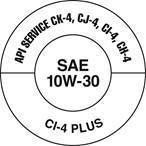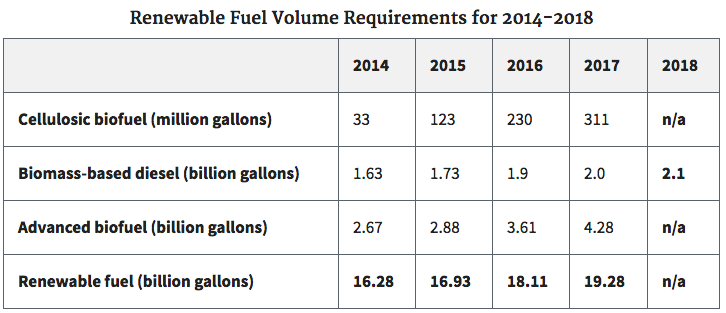As the year comes to a close it’s time to look at the future of fleets in 2017. New diesel specifications, driverless trucks, and connected cabins are only some of the news that is sure to dominate 2017. In this blog post we will look at some of the features making it onto fleets in 2017.
New Diesel Specifications
“Our new engine oil standards are developed to protect engines, meet new government regulations, and ensure engine oil performance,” says Kevin Ferrick, API Senior Manager of Training and Certifications, in reference to two new diesel engine oil standards, API Service Categories CK-4 and FA-4.
The new diesel categories are meant to provide enhanced protection against oil oxidation and protection against engine wear, particulate filter blocking, piston deposits, and degradation of low- and high-temperature properties. Official descriptions can be found on the API’s Categories and Documents page.
Along with the two new categories, two new Service Symbol Donuts were approved in May to identify the new specifications. The new CK-4 [right] and FA-4 symbols [left] should start appearing on diesel products and manufacturer recommendations in 2017.

Accompanying the new Service Symbol Donuts, the API has launched a dedicated site where consumers can view all the information on the new specifications. The site, dieseloilmatters.com, has FAQs, Guides, and toolkits to help you get prepared for the new specifications.
In addition to the two new diesel specification, the EPA has released 2017 and 2018 Renewable Fuel Standards. The final volumes represent continued growth over historic levels. The final standards meet or exceed the volume targets specified by Congress for total renewable fuel, biomass-based diesel, and advanced biofuel and are summarized below.

Driverless Trucks
In October 50,000 cans of Budweiser were delivered by semi truck from Fort Collins to Colorado Springs, an event which happens daily and would be otherwise unremarkable if it weren’t for one thing, the delivery was made in a self-driving truck.
In 2016 self-driving technology was big news, headed by Tesla’s autopilot mode and Uber’s self-driving cars making trips in San Francisco. However, the beer run made by Otto’s marks the first time a long-haul trip was completed by a self-driving truck. Although Otto’s truck is recognized as the first autonomous truck delivery, it wasn’t without a driver. Otto’s self-driving technology only works on the highway, meaning a driver was still required to do the city driving.
Although the technology is still out of the reach for most fleet companies it is important to note that Otto is not in the business of manufacturing trucks, instead they work on adding their own hardware to existing trucks. The Otto suite can be added to any automatic truck and includes three LIDAR laser detection units dot the cab and trailer, a radar bolts to the bumper, and a high-precision camera sits above the windshield.
Autonomous companies like Otto point to safety, efficiency, ecology, and meeting demand as their motivations for working on autonomous vehicles. According to the U.S. Department of Transportation’s 2015 Transportation Statistics Annual Report large trucks were responsible for up to 28% of road-based pollution, a high number considering trucks make up less than one percent of highway traffic according to the Bureau of Transportation Statistics. Semi trucks likewise have a disproportionate share of the accident statistics.
The hope is that system’s like Otto’s that take the lion’s share of the driving burden can make large truck pollution and accident rate decrease while not taking any driver jobs away. On the contrary, driverless trucks can help out with the driver-shortage the industry is facing, which in 2015 was estimated by the American Trucking Association to be nearly 500,000 drivers.
Connected Cabins
Another tech trend that is making it’s way onto big trucks in 2017 is connectivity. 2016 saw a boom of growth in the Internet of Things (IoT) which refers to the trend of adding internet connectivity to traditionally unconnected devices which can be anything from toasters, fridges, and coffee makers.
For fleets and drivers connectivity brings about to main benefits: comfort and safety. Mack Truck’s GuardDog® Connect system is focused on helping with uptime. The system is focused on maintenance and works by connecting the truck to a 24/7 network of support staff that helps identify fault codes and diagnostic needs.
Where Mack’s system focuses on individual trucks, International Trucks’ OnCommand™ Connection is focused on providing complete fleet management. The system gives access to a live view for a complete fleet and provides health reports, action plans, and more. For the individual truck and driver, International Trucks partners with Bendix and offers their Wingman® Advanced™ system which is an adaptive cruise control system that helps with collisions.
Freightliner similarly has two separate systems focused on fleet management and individual safety. The Detroit™ Connect system is aimed at fleet management and overview, however, new in 2017 will be the ability to make remote updates which will allow fleet managers to make over-the-air engine parameter updates and to receive Detroit-initiated engine and other powertrain electronic controller updates. This fleet management systems is coupled with their Detroit Assurance™ system which brings safety features powered by radar and laser systems to alert the driver of lane departures and more.
Fleet Services in Dallas, TX
Although 2017 is sure to bring a lot of brand new development to fleets, one thing is sure to stay the same: keeping every truck on your fleet clean will never go out of style. When your fleet needs an exterior washout, trailer cleaning, or interior cleaning make sure to call Fleet Clean USA: Dallas. Our professional crew will make sure your vehicles are thoroughly and safely cleaned and can even come to your location to services you fleet. Call +1 877-477-9274 today or contact us for a free quote!
